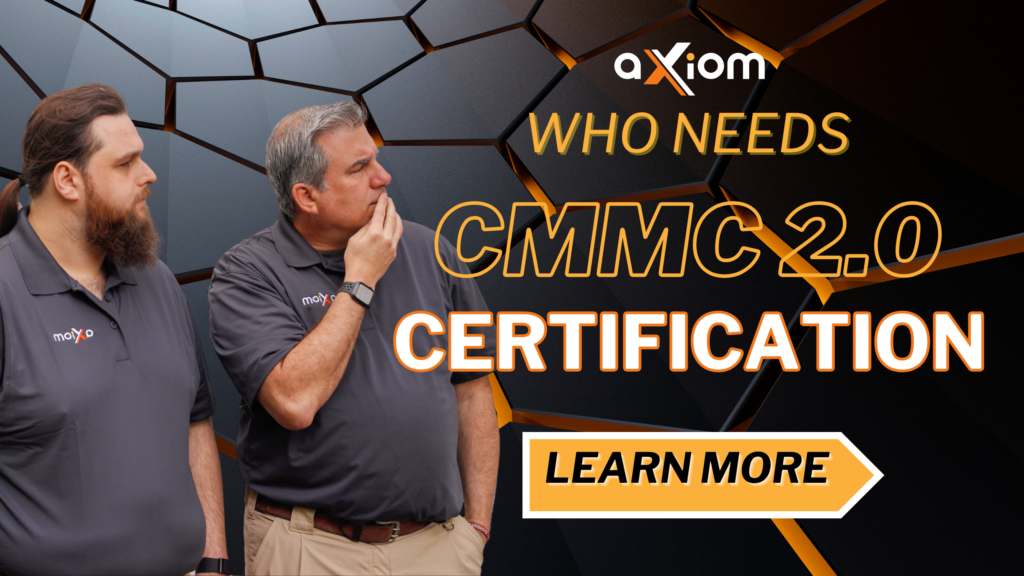
It’s an unfortunate fact that data breaches and cyberattacks have become increasingly prevalent and sophisticated. With threats constantly looming, cybersecurity has emerged as a cornerstone of modern business operations. Ensuring the confidentiality, integrity, and availability of sensitive data is not only a matter of regulatory compliance but also a fundamental requirement to maintain trust with clients and partners.
CMMC 2.0 (Cybersecurity Maturity Model Certification) has gained prominence as a comprehensive framework aimed at fortifying cybersecurity practices. Learn about who needs a CMMC certification, and how businesses can benefit from its principles.
How to Determine Whether You Need CMMC Certification or Not
CMMC is a framework for enhancing cybersecurity in organizations working with the U.S. Department of Defense (DoD). But exactly who needs a CMMC certification is an important question to answer. To ascertain whether your organization requires CMMC certification, consider the following factors:
1. Contractual Obligations
If your organization has or plans to bid on DoD contracts, subcontracts, or agreements that involve CUI, you will likely need CMMC certification. It is often stipulated as a contractual requirement.
2. Handling CUI
If your organization handles CUI (Controlled Unclassified Information), even if not directly related to DoD contracts, CMMC certification may be advisable, as it ensures robust data protection measures.
3. Supply Chain Position
If your organization is part of the defense supply chain, including suppliers and subcontractors, you may be required to achieve a specific CMMC level based on your role within the supply chain.
Following CMMC Guidelines Even If Certification Isn’t Required
Even if your organization is not mandated to obtain CMMC certification, adhering to CMMC guidelines is highly recommended. Cyber threats can target any organization, and adopting cybersecurity best practices can help safeguard your business, customer data, and reputation.
Understanding the CMMC 2.0 Guidelines
CMMC 2.0 builds upon its predecessor, CMMC 1.0, with a more flexible and scalable approach to cybersecurity. The key components of CMMC 2.0 include:
1. 14 Domains
The 14 domains each focus on different aspects of cybersecurity, ranging from access control and incident response to system and communications protection.
2. 3 Certification Levels
CMMC 2.0 introduces three certification levels, ranging from Level 1 (basic cybersecurity hygiene) to Level 3 (expert and proactive cybersecurity practices). Organizations must achieve the level appropriate to their role in the defense supply chain.
3. Maturity Processes
Maturity processes are incorporated within each domain. These processes allow organizations to demonstrate their cybersecurity practices are not only in place but also mature and continually improving.
How CMMC 2.0 Works to Strengthen Cybersecurity
CMMC is designed to enhance cybersecurity through:
- Risk Assessment: By categorizing and assessing risks, CMMC helps organizations identify vulnerabilities and prioritize cybersecurity measures.
- Scalability: The three CMMC certification levels allow organizations to scale their cybersecurity efforts according to their specific needs and roles within the supply chain.
- Third-Party Assessments: CMMC assessments are conducted by certified third-party assessors (C3PAOs) to ensure objectivity and compliance with established standards.
Partner with Axiom for Cybersecurity Excellence
As cybersecurity threats continue to grow in complexity and frequency, protecting your organization’s data and reputation is paramount. Whether you’re in the defense industry or not, adopting CMMC 2.0 guidelines can bolster your cybersecurity posture.
To navigate the intricacies of CMMC certification levels and ensure your organization’s compliance, partner with Axiom. Contact us today and see how we can help defend your business.